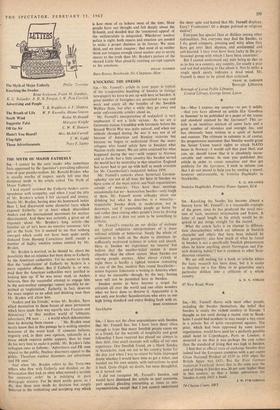The Myth of Major Eatherly Philip Toystbee Knocking the Swedes
Rime Svensson. Frani, M. Gardner. K. G Bolander, A. D. N. Forgot:. J. W. Pvnr Cornish Advertising and People T. B. Waddicor. J. F. Slidders
The Breath of Life W. P. Knowles. Diana Graves
South Wind Robin McDouall Suggestio Fats! Margaret Knight 011 the Air C. W. R. Hansen Hadn't You Heard? Mrs. Mabel Carroll Clog-light T. W, Gadd Those Advertisements Peter. F. Scanty
THE MYTH OF MAJOR FATHERLY SIR,-1 cannot be the only reader who sometimes feels oppressed by the Spectator's prevailing editorial tone of sour pseudo-realism. Mr. Ronald Bryden, who is usually worthy of respect, surely fell into that dominant mode in his article called The Myth of Major Eatherly.
I had myself reviewed the Eatherly-Anders corre- spondence with sympathy, and when I read the title of Mr. Bryden's article I felt alarmed and uneasy. Surely Mr. Bryden, having done his homework better than I, had. discovered some shameful facts which exposed Eatherly, or at least which discredited Anders and the international movement for nuclear disarmament. And there was certainly a great air of exposure about Mr. Bryden's long article—the familiar air of let's have no emotive nonsense; let's get at the facts. Yet it seemed to me that nothing emerged which could not have been quite easily deduced from Burning Conscience itself, except a number of highly emotive noises emitted by Mr. Bryden.
Mr. Bryden is worried, as he should be, about the possibility that an injustice has been done to Eatherly by the American authorities. Yet he seems to think that the 'exploitation' of Eatherly by Ar.ders is a more repulsive offence. But if Eatherly is, or was, mad then the American authorities were justified in locking him up. If he was never mad, as Anders believes, then the successful attempt to engage him in the anti-nuclear campaign cannot possibly be de- scribed as 'exploitation.' Eatherly, in fact, deserves far more respect as an adult and thinking man than Mr. Bryden will allow him.
'Anders and his friends,' writes Mr. Bryden, 'have allied themselves to those forces of mass persuasion which have made their way equally into Fascism and democracy: to that modern world of lobbyists, advertisers, PR men . . . a world which dehumanises men by denying them reason . . ' Mr. Bryden must surely know that in this passage he is writing emotive nonsense of the worst kind. If someone believes urgently and, in their own opinion, rationally in a cause which requires public support, then he must do his very best to make it public. Mr. Bryden's false syllogism runs as follows: 'Advertisers and PR men appeal to the public. Nuclear disarmers appeal to the Public. Therefore nuclear disarmers are advertisers and PR men.
And when Mr. Brydcn refers to the 'forty-two others who flew with Eatherly and decided, on the information they had, to obey what seemed a terrible but necessary order' he is indulging in pure demagogic oratory. For he 'must surely guess, as 1 do, that these men made ho decision but simply behaved in the unthinking and accepting way which is how most of us behave most of the time. Most people have not thought and felt deeply about the H-bomb, and decided that the 'emotional appeal' of the unilateralists is misguided. Whichever nuclear policy is right, both reason and emotion are needed to make a proper decision in its favour. We must think and we must imagine: that most of us neither think nor imagine enough about nuclear war is surely nearer to the truth than Mr. Bryden's picture of the shrewd Little Man pluckily resisting corrupt appeals to his emotions.


































 Previous page
Previous page